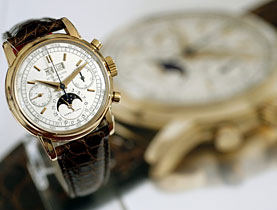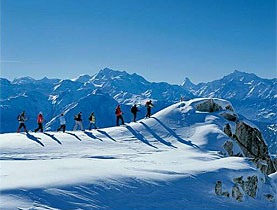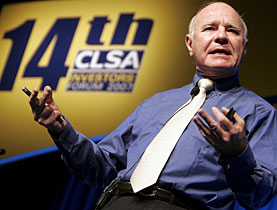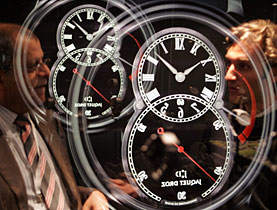Geneva luxury industry to escape slowdown

Geneva's luxury goods industry is likely to escape the worst effects of the economic slowdown thanks to Swiss watchmakers, according to a report by Credit Suisse.
It said strong sales of top-of-the-range Swiss watches in Asia were expected to prop up weaker growth elsewhere. But other sectors of Geneva’s luxury market – art, jewellery and five-star hotels – will feel the pinch of the global economic crisis.
In canton Geneva the luxury goods industry represents approximately 60 per cent of all exports and seven per cent of jobs, after finance and international organizations.
But according to Lars Kalbreier, director of Equities & Alternatives Research at Credit Suisse, the industry’s short-term outlook remains favourable, thanks to sales of expensive watches – priced over SFr3,000 ($2,500) – in Asia.
“They will offset the slowdown in demand from western countries,” Kalbreier told the Swiss News Agency, following the publication of a Credit Suisse report “The luxury goods industry: situation and prospects” on Wednesday.
Apart from Japan, economic growth is expected to continue over the next few years in Asia, which represented some 44 per cent of Swiss watch sales in 2007.
Tick tock
The Credit Suisse report was published as experts are generally predicting a more severe downturn for the global luxury goods market.
In early October, consulting firm Bain and Co. said that after ten years’ steady expansion luxury goods sales would fall globally in the fourth quarter, and could drop by up to seven per cent next year.
Earlier in November, Swiss watchmaker Hublot said it was bracing itself for a tougher 2009 even though sales have continued to improve in 2008, while seller of Cartier watches, Richemont, has warned of uncertain times ahead.
But on Monday the Swatch Group, the world’s largest watchmaker, said it was still optimistic for growth in all its divisions in 2009, despite the economic slowdown.
“In the current situation, our forecast is still for growth that will continue in all segments. Not only in luxury, but also in the mid and lower tiers,” chairman Nicolas G. Hayek told L’Agefi daily newspaper on Monday.
And according to recent figures published by the Federation of the Swiss Watch Industry, sales of top-end watches should continue in 2009. But growth will be limited to five per cent in 2009, compared with ten per cent in 2008 and 16 per cent in 2007.
All that glitters
While the situation looks slightly rosier for the watch industry, there are bigger question marks over art and jewellery.
“The Geneva art market, which mainly focuses on sales of classic works of art and jewellery, is traditionally less exposed to economic downturns than contemporary art,” said Kalbreier.
“But recently the big international auctions have pointed towards a fall in classical art and jewellery. We are therefore also expecting a drop in volumes in Geneva.”
Next week’s auctions of fine jewels, watches and wine in Geneva should provide a reality check of the wealthy’s buying trends as the financial crisis takes hold.
But new jewellery, where 50 per cent of sales are made in the United States, should suffer more heavily from the slowdown in the US economy.
In October top-quality, unpolished diamonds became the latest victims of the credit crunch,
According to a diamond expert, trading in big stones had nearly lurched to a halt due to the financial crisis. Before the latest wave of economic turmoil, with the sector struggling under heavy debt, prices of top gems had held up while the price for smaller, mass-market diamonds slumped.
“Experts predict a slip in jewellery sales in 2009, but this is not quantifiable,” said Kalbreier.
Checking in sir?
Another sector likely to feel the pinch is the luxury hotel industry.
After a three-year boom, sustained by infrastructure renovations and investments, a growth in overnight stays and a weaker Swiss franc versus the Euro, Geneva’s five-star hotels are expected to suffer.
The sector is highly dependent on clients from the Middle East and on business people who are now travelling less. It will also be greatly affected by the current strength of the franc against the Euro.
“Luxury hotels in Geneva, as in the rest of Europe, are expected to register a seven-per-cent drop in activity, similar to previous recessions in 1990 and 2000,” said Kalbreier.
But once the economic storms have subsided, Geneva should once again benefit from rapid consumer growth in newly industrialized countries and an economic upturn in developed countries, says Credit Suisse.
swissinfo, Simon Bradley in Geneva
The luxury goods market, which has steadily expanded for more than a decade, is expected to slip between 3 per cent and 7 per cent in 2009, to between €163 billion (US$214.9 billion) and €170 billion (US$224.13 billion) in sales, according to a study published in October by consultants Bain & Co.
Europe remains the world’s biggest luxury market, worth an estimated €67 billion (US$88.33 billion) in 2008. The United States is the biggest single country market, worth about €55 billion (US$72.51 billion) in 2008.

In compliance with the JTI standards
More: SWI swissinfo.ch certified by the Journalism Trust Initiative




You can find an overview of ongoing debates with our journalists here. Please join us!
If you want to start a conversation about a topic raised in this article or want to report factual errors, email us at english@swissinfo.ch.